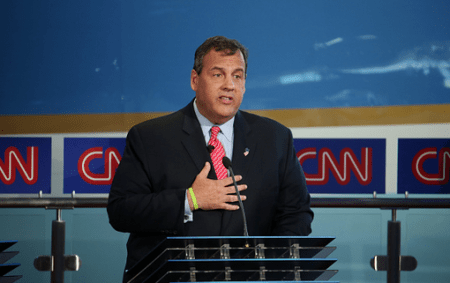In late 2013, various media outlets had already begun collecting polling data on 2016 presidential hopefuls. According to those polls, Chris Christie, governor of New Jersey, was the clear favorite on the Republican side. In polling data compiled by RealClearPolitics between November 2013 and mid-January 2014, he led in every single poll for the 2016 Republican nomination.
The story line has changed significantly since his glory days at the end of 2013. Due to a scandal involving lane closures and traffic jams, Christie quickly lost support and is now considered no more than a fringe candidate. In a recent CNN poll, Christie’s support sat at just 2 percent, which puts him in 10th place among Republican candidates.
Christie’s rise and fall in U.S. politics began in his home state of New Jersey, where he’s served as U.S Attorney for the state and is currently the governor. As the U.S. Attorney for New Jersey from 2001 to 2008, he focused largely on fighting public corruption, which he believed had become a problem in the state. In campaigning for governor, he overcame the fact that New Jersey had traditionally voted Democrat and won against incumbent Jon Corzine, a Democrat and former CEO of Goldman Sachs.
Christie gained significant popularity for being able to win support in a blue state and becoming a star in the Republican Party. He considered a presidential campaign for the 2012 election but opted against it. Because of his popularity in the GOP, he was chosen as the party’s keynote speaker during the 2012 Republican National Convention. In November 2013, he was re-elected for a second term as governor of New Jersey. It was at this point when he reached the height of his popularity and was a front-runner for the 2016 Republican nomination.
The next several months would be his unraveling due to the “Bridgegate” scandal. One of Christie’s aides closed traffic lanes that normally allowed access to the George Washington Bridge connecting Fort Lee, New Jersey, and New York City. These lane closures, which occurred in September 2013, caused massive traffic jams and eventually prompted a state investigation into why they had occurred.
Many people in the media accused Christie of ordering the closures to anger the Fort Lee mayor for not supporting Christie’s gubernatorial campaign in the prior year. Although he denied any involvement, Christie lost his popularity and saw his polling numbers fall significantly after the scandal.
His campaign has failed to regain momentum since his fall from front-runner status. As of August 2015, he and his PACs had raised only $14 million, eighth place among presidential candidates. Jeb Bush had raised $120 million by the same date.
Campaigning in a crowded Republican field means Christie has to set himself apart from other candidates. According to CNN, he’s been known for having a pugnacious attitude, once telling a heckler to “sit down and shut up” during a speech about Hurricane Sandy. While some might find his attitude unpleasant, it will likely help him garner additional media attention during his campaign.
Christie sets himself apart from other candidates by having less conservative stances on many key issues. While many Republican candidates have spoken about the need for stricter border control, Christie has taken a different approach. He argues that stricter employment regulations for immigrants will solve problems at the border without adding additional security. His track record as governor also highlights his more moderate views. During his current tenure as governor, the state government has increased spending and borrowing. This practice does not fall in line with the rest of the Republican field. Many of his rivals have campaigned on the need to reduce the government’s size and cut the federal deficit.
Christie has also been criticized for cozying up to President Obama in the aftermath of Hurricane Sandy, complimenting the president for the way the federal government dealt with the aftermath of the storm. Although Christie has since stated that he is not friends with Obama, other members of the GOP have used it to argue that Christie is not a true Republican.
On the campaign trail, Christie has spoken largely about his track record in criminal justice reform. He has also emphasized a need for tax reform that he believes will bolster economic growth in the country.
According to data journalism website FiveThirtyEight.com, Christie’s chances for the Republican nomination are bleak. The website argues that he is too moderate to gain the support of the Republican establishment. It also notes that his Bridgegate scandal and slumping favorability ratings indicate that he is no longer as electable as he used to be.
Rick Perry announced on Sept. 11 on Twitter that he was dropping out of the race. Many reports indicate that his lack of financial support and his mediocre polling numbers were the reasons for ending the campaign. Both Perry and Christie have been polling in the low single digits for the past few weeks.
With such a crowded field of candidates, it’s only a matter of time before those who lack support will be forced out. If Christie’s pugnacious attitude fails to raise his polling numbers or rake in more fundraising dollars, he may face a fate similar to Perry’s.










